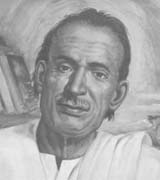 |
 |
| Back to Home |
|
|
 |
| Patriot and intellectual, Acharya Kripalani was a Gandhian all his life and a critic of the Establishment. He reveled in satire and spoke and wrote with biting irony and sarcasm. He was known as gadfly. |
|
|
|
|
| Acharya (scholar) Jiwantram Bhagwandas Kripalani was a Gandhian Socialist, environmentalist, mystic and freedom fighter, noted for his incorruptibility and determination. He grew close to Gandhiji and became in time one of his most ardent disciples. Tall, distinguished, dressed in khadi and with an incongruously elegant goatee, Acharya Kripalani was a familiar figure to generations of dissenters, from the Non-Cooperation Movements of the 1920s through till the Emergency of the 1970s. |
| Jivatram (also spelled Jiwatram) Bhagwandas Kripalani was born in current-day
Gujarat in 1888. He was of Sindhi and Gujarati roots. Following his education
at Fergusson College in Bombay, he worked as a schoolteacher before joining
the freedom movement in the wake of Gandhiji's return from South Africa.
Kripalani was involved in the Non-Cooperation Movement of the early 1920s, and worked in Gandhi's ashrams in Gujarat and Maharashtra on tasks of social reform and education, and later left for Bihar and Uttar Pradesh in northern India to teach and organize new ashrams. He also courted arrest on numerous occasions during the Civil Disobedience movements and smaller occasions of organizing protests and publishing what the British considered seditious material.  |
| Kripalani joined the All India Congress Committee and became its General
Secretary in 1928-29.
Kripalani as Gandhiji's closest lieutenant in the party, was prominently
involved over a decade in top Congress party affairs, and in the organization
of the Salt Satyagraha and the Quit India Movement. Kripalani served in
the interim Government of India (1946-1947) and served in the Constituent
Assembly of India.
|
| Prominent in the party, with Gandhiji's support - and in spite of being
ideologically at odds with both the right-wing Sardar Patel and the Fabian
Socialist Pandit Nehru - he was elected Congress President for the crucial
years around Indian Independence in 1947. While he performed sterling service
during the riots that accompanied Partition, he lost a major political
battle when, after Gandhiji's assassination in January 1948, Nehru rejected
his demand that the party's views should be sought in all decisions. Nehru,
with the support of Sardar Patel, told the Congress president that while
the party was entitled to lay down the broad principles and guidelines,
it could not possibly be granted a say in the government's day-to-day affairs.
This precedent became central to the relationship between government and
ruling party in subsequent decades.
Nehru, however, swung his support behind Kriplani for the tumultuous election of the Congress President in 1950. Considered a vital battle for the party between the left - led by Nehru - and the right - led by Patel, Kriplani went up against Patel's lieutenant Purushottam Das Tandon. In an atmosphered soured by communal tension, the controversial reconstruction of the Somnath Temple, the founding of the Jan Sangh, and the Nehru-Liaquat Pact, as well as differences on economic policy, Tandon narrowly defeated Kriplani. Bruised by this defeat, and disillusioned by what he viewed as the abandonment of the Gandhian ideal of a countless village republics, Acharya Kriplani left the Congress and was one of the primary founders of the Kisan Mazdoor Praja Party. This party subsequently merged with the Socialist Party of India to form the Praja Socialist Party. For a while it was even believed that Nehru, stung by the defeat, was
considering abandoning the Congress as well; his several offers of resignation
at the time were all, however, shouted down. A great many of the more progressive
elements of the party left in the months following the election, however;
and the subsequent bias to the right was only balanced when Nehru obtained
the resignation of Purushottam Das Tandon as Congress President in the
run up to the general elections of 1951.
|
| Kripalani remained a critic of Prime Minister Nehru's policies and
administration, while working for social and environmental causes.
While remaining active in electoral politics, Kriplani gradually became more of a spiritual leader of the socialists than anything else; in particular, he was generally considered to be, along with Vinoba Bhave, the leader of the what remained of the Gandhian faction in society. He was active, along with Acharya Bhave, in preservation and conservation activities throughout the 1970s. His crusading instincts were aroused for the last time in 1972-3 by Indira Gandhi, then in power and increasingly authoritarian in style. Kripalani and Narayan felt that Gandhi's rule had become dictatorial and anti-democratic, and her conviction on charges of using government machinery for her election campaign galvanized her political opposition and public disenchantment against her policies. Along with Jaya Prakash Narayan and Lohia, Kriplani toured the country ceaselessly urging non-violent protest and civil disobedience. When the Emergency was declared as a result of the vocal dissent he helped stir up, the octogenarian Kriplani was among the first of the Opposition leaders to be arrested on the night of 26th June 1975. He lived long enough to survive the Emergency and see, as one of its two moral helms, the first non-Congress government since Independence following the Janata triumph in the 1977 polls. He died on March 19, 1982, at the age of 94.
|
| Back to Home |
|
||||
 |
 |
 |
 |
 |